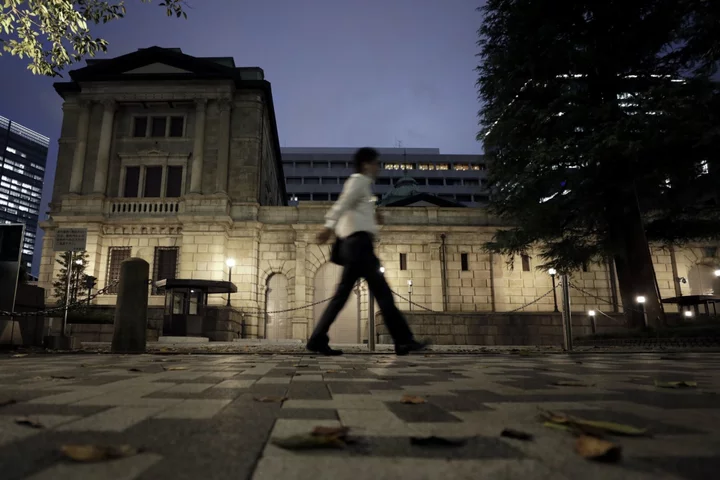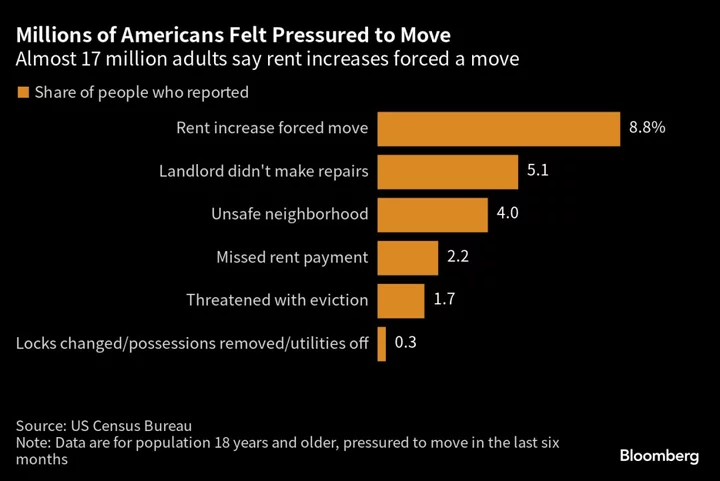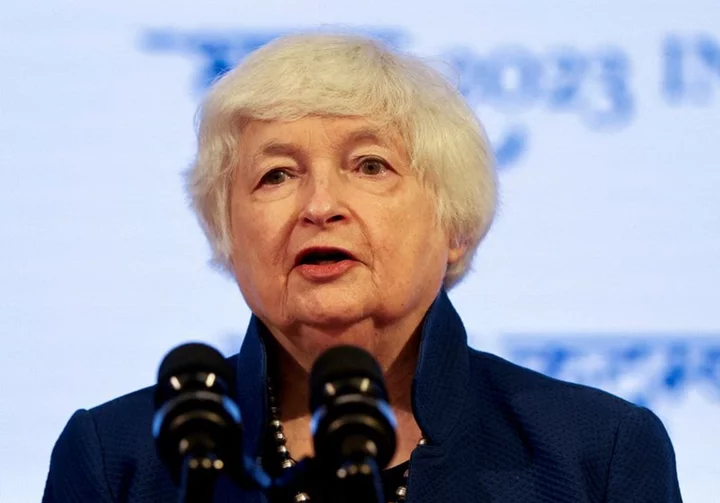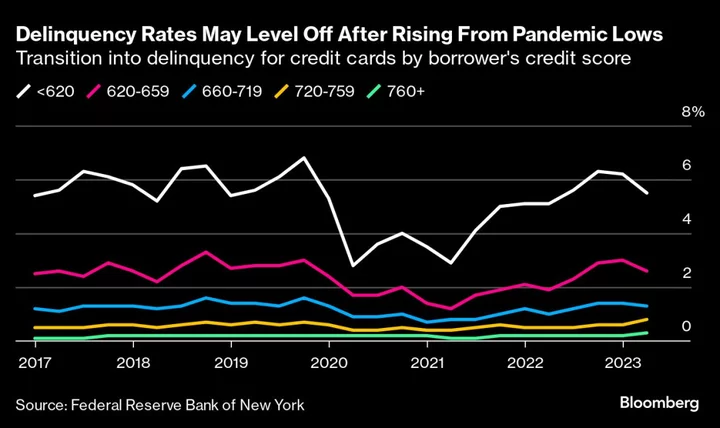The Bank of Japan turned to its loans-for-bonds program to curb rising yields after the governor’s comments on the negative interest rate policy sparked a rout in the nation’s debt market.
The announcement Monday had little impact on climbing sovereign bond yields and the yen extended its advance versus the dollar to more than 1%. Traders continued to focus their attention on Governor Kazuo Ueda’s latest remarks on the possibility of ending the developed world’s last key negative rate regime.
While the Japanese policymakers are likely to be pleased by the move in the yen after its bout of weakness this year, they appear to on guard against yields rising too rapidly.
Japanese bank shares jumped after Ueda told the Yomiuri newspaper it’s possible the BOJ will have enough information by year-end to judge if wages will continue to rise — a key factor in deciding whether to pare back its super-easy policy.
If the central bank becomes confident prices and wages will keep going up sustainably, ending negative interest rates is among the options available, Ueda said in the interview published Saturday. Still, he said the BOJ is some distance away from achieving its price stability target and would continue its patient monetary easing.
The yen strengthened 1.1% to 146.16 per dollar in Asia trading Monday, while Japan government bond futures dropped after the BOJ’s offer of loans to banks. An earlier rise in the benchmark yield to 0.7% helped push up the Topix banks index as much as 4.7% to its peak level since August 2008. Higher interest rates typically support profits at financial institutions.
Many analysts viewed the timing of Ueda’s comments as an attempt to support the yen and stave off the need for Japan to intervene in currency markets as it did last year. Some also interpreted the remarks to be a clear hint on the future policy direction of the central bank and the possibility of a near-term end to negative rates in Japan.
Ueda Says BOJ May Know Enough About Wages by Year-End: Yomiuri
The weakening yen was likely on his mind, said Hideo Kumano, executive economist at Dai-Ichi Life Research Institute and a former BOJ official, adding that comments helping prop up the currency would be welcomed by a government that is hesitant to step into markets again.
“Ueda is hinting at an earlier policy shift than expected,” Kumano said. “If intervention isn’t going to work, the onus will be on the central bank. The question is increasingly whether the BOJ will adjust its policy to quell pressure on the yen.”
The yawning interest-rate gap between Japan and the US has been a key factor in yen weakness, making the higher-yielding dollar more appealing. The US Treasury 10-year yield offers about 360 basis points more than Japan’s equivalent bonds. The Japanese currency has slumped almost 11% this year and is close to a more than three-decade low and levels at which officials last stepped in to prop it up.
“We expect the end to negative interest rate policy in the first three months of 2024,” said Takeshi Ishida, currency strategist in Tokyo at Resona Bank Ltd. “Ueda may have started to encourage the market to price in such a scenario.”
Still, with US 10-year Treasury yields above 4%, it will be difficult for traders to test how much the dollar may drop against the yen, with just speculation of a policy tweak, he said.
Japanese officials have said this month they won’t rule out any measures to address excessive moves, signaling they are ready to intervene in the currency market if needed, but some in the market are skeptical about whether the authorities will take action now.
“The speed of the yen’s depreciation has been slower than last year and is not considered a ‘speculative move’, making it hard to conduct yen-buying intervention,” Naomi Muguruma, chief fixed-income strategist at Mitsubishi UFJ Morgan Stanley Securities Co. in Tokyo, wrote in a note. “Ueda’s hawkish comments may be intended to keep yen depreciation in check.”
The fate of the BOJ’s subzero rate is receiving greater market attention after the central bank adjusted its yield curve control program in July. While the BOJ may still step in with unscheduled buying operations to slow upward yield moves on 10-year government debt, and may do just that following the jump in yields on Monday, it has loosened its guide rails on yields considerably.
Ueda’s remarks sent a fresh reminder to BOJ watchers that not just a formal scrapping of YCC but the risk of a short-term rate increase should also be on the radar. Only a fifth of economists expected a rate increase by April in a Bloomberg survey released in early August.
Among the BOJ board, former private banker Naoki Tamura recently sounded most willing to raise rates once the sustainability of inflation is confirmed. He said the inflation target has come “clearly” in sight and ending negative rate is among options with the achievement of the goal possible around the first quarter of 2024.
Consensus Needed
But other board members sounded more cautious notes in recent speeches, suggesting Ueda will still need to build consensus if he wants to raise short-term rates in the near-term.
The latest data showed growth in Japanese workers’ wages slowed again in July, indicating the labor market may be losing some steam and clouding prospects for Ueda’s sustainable inflation goal. The data, which also showed some encouraging signs of gains outside the headline figure, came amid growing calls for higher wages across all pockets of the workforce.
“Wage growth remains weak and weakening,” wrote Commonwealth Bank of Australia’s Joseph Capurso and Kristina Clifton in a currency strategy note. “We expect dollar-yen’s upside momentum to resume later this week.”
--With assistance from Daisuke Sakai, Masaki Kondo and Michael G. Wilson.
(Adds BOJ offering loans to banks to curb rises in bond yields.)
Author: Yumi Teso, Matthew Burgess and Toru Fujioka









